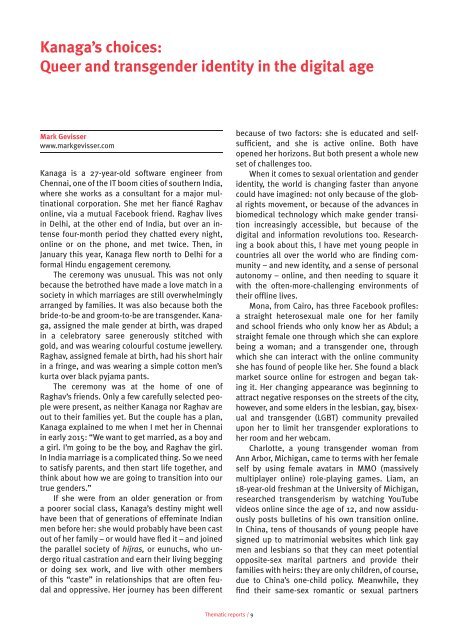Global Information Society Watch 2015
gw2015-full-report
gw2015-full-report
You also want an ePaper? Increase the reach of your titles
YUMPU automatically turns print PDFs into web optimized ePapers that Google loves.
Kanaga’s choices:<br />
Queer and transgender identity in the digital age<br />
mark Gevisser<br />
www.markgevisser.com<br />
Kanaga is a 27-year-old software engineer from<br />
Chennai, one of the IT boom cities of southern India,<br />
where she works as a consultant for a major multinational<br />
corporation. She met her fiancé Raghav<br />
online, via a mutual Facebook friend. Raghav lives<br />
in Delhi, at the other end of India, but over an intense<br />
four-month period they chatted every night,<br />
online or on the phone, and met twice. Then, in<br />
January this year, Kanaga flew north to Delhi for a<br />
formal Hindu engagement ceremony.<br />
The ceremony was unusual. This was not only<br />
because the betrothed have made a love match in a<br />
society in which marriages are still overwhelmingly<br />
arranged by families. It was also because both the<br />
bride-to-be and groom-to-be are transgender. Kanaga,<br />
assigned the male gender at birth, was draped<br />
in a celebratory saree generously stitched with<br />
gold, and was wearing colourful costume jewellery.<br />
Raghav, assigned female at birth, had his short hair<br />
in a fringe, and was wearing a simple cotton men’s<br />
kurta over black pyjama pants.<br />
The ceremony was at the home of one of<br />
Raghav’s friends. Only a few carefully selected people<br />
were present, as neither Kanaga nor Raghav are<br />
out to their families yet. But the couple has a plan,<br />
Kanaga explained to me when I met her in Chennai<br />
in early <strong>2015</strong>: “We want to get married, as a boy and<br />
a girl. I’m going to be the boy, and Raghav the girl.<br />
In India marriage is a complicated thing. So we need<br />
to satisfy parents, and then start life together, and<br />
think about how we are going to transition into our<br />
true genders.”<br />
If she were from an older generation or from<br />
a poorer social class, Kanaga’s destiny might well<br />
have been that of generations of effeminate Indian<br />
men before her: she would probably have been cast<br />
out of her family – or would have fled it – and joined<br />
the parallel society of hijras, or eunuchs, who undergo<br />
ritual castration and earn their living begging<br />
or doing sex work, and live with other members<br />
of this “caste” in relationships that are often feudal<br />
and oppressive. Her journey has been different<br />
because of two factors: she is educated and selfsufficient,<br />
and she is active online. Both have<br />
opened her horizons. But both present a whole new<br />
set of challenges too.<br />
When it comes to sexual orientation and gender<br />
identity, the world is changing faster than anyone<br />
could have imagined: not only because of the global<br />
rights movement, or because of the advances in<br />
biomedical technology which make gender transition<br />
increasingly accessible, but because of the<br />
digital and information revolutions too. Researching<br />
a book about this, I have met young people in<br />
countries all over the world who are finding community<br />
– and new identity, and a sense of personal<br />
autonomy – online, and then needing to square it<br />
with the often-more-challenging environments of<br />
their offline lives.<br />
Mona, from Cairo, has three Facebook profiles:<br />
a straight heterosexual male one for her family<br />
and school friends who only know her as Abdul; a<br />
straight female one through which she can explore<br />
being a woman; and a transgender one, through<br />
which she can interact with the online community<br />
she has found of people like her. She found a black<br />
market source online for estrogen and began taking<br />
it. Her changing appearance was beginning to<br />
attract negative responses on the streets of the city,<br />
however, and some elders in the lesbian, gay, bisexual<br />
and transgender (LGBT) community prevailed<br />
upon her to limit her transgender explorations to<br />
her room and her webcam.<br />
Charlotte, a young transgender woman from<br />
Ann Arbor, Michigan, came to terms with her female<br />
self by using female avatars in MMO (massively<br />
multiplayer online) role-playing games. Liam, an<br />
18-year-old freshman at the University of Michigan,<br />
researched transgenderism by watching YouTube<br />
videos online since the age of 12, and now assiduously<br />
posts bulletins of his own transition online.<br />
In China, tens of thousands of young people have<br />
signed up to matrimonial websites which link gay<br />
men and lesbians so that they can meet potential<br />
opposite-sex marital partners and provide their<br />
families with heirs: they are only children, of course,<br />
due to China’s one-child policy. Meanwhile, they<br />
find their same-sex romantic or sexual partners<br />
Thematic reports / 9


